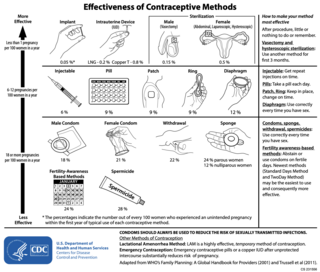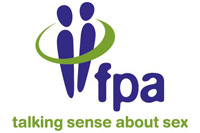Related Research Articles

Family planning is the consideration of the number of children a person wishes to have, including the choice to have no children, and the age at which they wish to have them. Things that may play a role on family planning decisions include marital situation, career or work considerations, financial situations. If sexually active, family planning may involve the use of contraception and other techniques to control the timing of reproduction.

Sexual and reproductive health (SRH) is a field of research, health care, and social activism that explores the health of an individual's reproductive system and sexual well-being during all stages of their life. Sexual and reproductive health is more commonly defined as sexual and reproductive health and rights, to encompass individual agency to make choices about their sexual and reproductive lives.
Contraception was illegal in Ireland from 1935 until 1980, when it was legalised with strong restrictions, later loosened. The ban reflected Catholic teachings on sexual morality.

There are many methods of birth control that vary in requirements, side effects, and effectiveness. As the technology, education, and awareness about contraception has evolved, new contraception methods have been theorized and put in application. Although no method of birth control is ideal for every user, some methods remain more effective, affordable or intrusive than others. Outlined here are the different types of barrier methods, hormonal methods, various methods including spermicides, emergency contraceptives, and surgical methods and a comparison between them.
MSI Reproductive Choices, named Marie Stopes International until November 2020, is an international non-governmental organisation providing contraception and safe abortion services in 37 countries around the world. MSI Reproductive Choices as an organisation lobbies in favour of access to abortion, and provides a variety of sexual and reproductive healthcare services including advice, vasectomies, and abortions in the UK and other countries where it is legal to do so. It is based in London and is a registered charity under English law.

The Family Planning Association (FPA) was a UK registered charity working to enable people to make informed choices about sex and to enjoy sexual health. It was the national affiliate for the International Planned Parenthood Federation in the United Kingdom. Founded in 1930, the FPA celebrated its 80th anniversary in 2010. Its motto was "Talking sense about sex". The charity was placed into liquidation on 15 May 2019, but the FPA name continues as a limited company selling sexual health resources.
Contraceptive security is an individual's ability to reliably choose, obtain, and use quality contraceptives for family planning and the prevention of sexually transmitted diseases. The term refers primarily to efforts undertaken in low and middle-income countries to ensure contraceptive availability as an integral part of family planning programs. Even though there is a consistent increase in the use of contraceptives in low, middle, and high-income countries, the actual contraceptive use varies in different regions of the world. The World Health Organization recognizes the importance of contraception and describes all choices regarding family planning as human rights. Subsidized products, particularly condoms and oral contraceptives, may be provided to increase accessibility for low-income people. Measures taken to provide contraceptive security may include strengthening contraceptive supply chains, forming contraceptive security committees, product quality assurance, promoting supportive policy environments, and examining financing options.

Birth control, also known as contraception, anticonception, and fertility control, is the use of methods or devices to prevent pregnancy. Birth control has been used since ancient times, but effective and safe methods of birth control only became available in the 20th century. Planning, making available, and using human birth control is called family planning. Some cultures limit or discourage access to birth control because they consider it to be morally, religiously, or politically undesirable.
Unintended pregnancies are pregnancies that are mistimed or unwanted at the time of conception, also known as unplanned pregnancies.
A, B and C v Ireland is a landmark 2010 case of the European Court of Human Rights on the right to privacy under Article 8. The court rejected the argument that article 8 conferred a right to abortion, but found that Ireland had violated the European Convention on Human Rights by failing to provide an accessible and effective procedure by which a woman can have established whether she qualifies for a legal abortion under current Irish law.

The birth control movement in the United States was a social reform campaign beginning in 1914 that aimed to increase the availability of contraception in the U.S. through education and legalization. The movement began in 1914 when a group of political radicals in New York City, led by Emma Goldman, Mary Dennett, and Margaret Sanger, became concerned about the hardships that childbirth and self-induced abortions brought to low-income women. Since contraception was considered to be obscene at the time, the activists targeted the Comstock laws, which prohibited distribution of any "obscene, lewd, and/or lascivious" materials through the mail. Hoping to provoke a favorable legal decision, Sanger deliberately broke the law by distributing The Woman Rebel, a newsletter containing a discussion of contraception. In 1916, Sanger opened the first birth control clinic in the United States, but the clinic was immediately shut down by police, and Sanger was sentenced to 30 days in jail.

Birth control in the United States is available in many forms. Some of the forms available at drugstores and some retail stores are male condoms, female condoms, sponges, spermicides, over-the-counter progestin-only contraceptive pills, and over-the-counter emergency contraception. Forms available at pharmacies with a doctor's prescription or at doctor's offices are oral contraceptive pills, patches, vaginal rings, diaphragms, shots/injections, cervical caps, implantable rods, and intrauterine devices (IUDs). Sterilization procedures, including tubal ligations and vasectomies, are also performed.
The history of birth control, also known as contraception and fertility control, refers to the methods or devices that have been historically used to prevent pregnancy. Planning and provision of birth control is called family planning. In some times and cultures, abortion had none of the stigma which it has today, making birth control less important.
Reproductive coercion is a collection of behaviors that interfere with decision-making related to reproductive health. These behaviors are often perpetrated by a current, former, or hopeful intimate or romantic partner, but they can also be perpetrated by parents or in-laws, or by policies of institutions or government. Coercive behaviors infringe on individuals' reproductive rights and reduce their reproductive autonomy.
Women's reproductive health in Russia refers to the set of physical, mental, and social health issues and services available to women in Russia. It includes the rights, laws, and problems experienced by women and their families regarding proper reproductive health. Women account for over half of the Russian population and are considered a vulnerable population due to political and social problems from inequalities in gender, age, socioeconomic status, and geographical location that affect access to comprehensive health care. As Russia struggles with a decreasing birthrate and increase in STIs, HIV, and poor reproductive health care, the need for government financed services and international programs is essential to successfully reach this vulnerable population. Currently, women in Russia access care through government funded free services, private insurance, and NGO programs.
Women's reproductive health in the United States refers to the set of physical, mental, and social issues related to the health of women in the United States. It includes the rights of women in the United States to adequate sexual health, available contraception methods, and treatment for sexually transmitted diseases. The prevalence of women's health issues in American culture is inspired by second-wave feminism in the United States. As a result of this movement, women of the United States began to question the largely male-dominated health care system and demanded a right to information on issues regarding their physiology and anatomy. The U.S. government has made significant strides to propose solutions, like creating the Women's Health Initiative through the Office of Research on Women's Health in 1991. However, many issues still exist related to the accessibility of reproductive healthcare as well as the stigma and controversy attached to sexual health, contraception, and sexually transmitted diseases.
Abortion in Uganda is illegal unless performed by a licensed medical doctor in a situation where the woman's life is deemed to be at risk.
Abortion in Kazakhstan is legal as an elective procedure up to 12 weeks, and special circumstances afterwards. The relevant legislation is based on the laws inherited from the country's Soviet past, when abortion was legally permitted as a contraceptive.
Contraceptive rights in New Zealand are extensive. There are many options available to women seeking contraception. There are also options for men. Government funding keeps the cost of most types of contraception low in most cases. Family planning options in New Zealand are generally in keeping with the United Nations stance towards sexual and reproductive rights although the country has received criticism in some aspects.
James Loughran was an Irish general practitioner and a founding member of the movement that led to the establishment of the Irish Family Planning Association (IFPA).
References
- ↑ Website Archived 2012-03-10 at the Wayback Machine
- ↑ "History of sexual health in Ireland". IFPA. Archived from the original on November 2, 2012. Retrieved October 30, 2012.
- 1 2 3 4 http://ifpa.hyperlink.ie/index.php/eng/content/download/371/2519/file/pro-life_irishquestion.pdf%5B%5D
- ↑ The Field day anthology of Irish writing: Irish women's writing and traditions edited by Angela Bourke; NYU Press 2002, pp. 200-201
- ↑ Ferriter, Diarmaid (2012). Ambiguous Republic: Ireland in the 1970s. Profile Books. ISBN 9781847658562.
- 1 2 Cunningham, Dr John (March 2011). "Spreading VD all over Connacht: Reproductive rights and wrongs in 1970s Galway" (PDF). Galway. NUI Galway. Archived from the original (PDF) on November 2, 2013. Retrieved November 23, 2012.
- ↑ Andrews, Kernan (10 March 2011). "1970s Galway, condoms, and the Advertiser". Local News. Galway Advertiser. Retrieved November 23, 2012.
- ↑ Irish Statute Book: Health (Family Planning) Act, 1979 (Section 4) Archived 2005-05-08 at the Wayback Machine
- ↑ The Nation, 30 March 1992
- ↑ Murphy-Lawless, Jo (November 1993). "Fertility, Bodies and Politics: The Irish Case". Reproductive Health Matters. 1 (2). RHM: 53–64. doi: 10.1016/0968-8080(93)90007-g . JSTOR 3775009.
- ↑ ECHR 2032
- ↑ "'Moral values' of abortion law defended, The Irish Times 12 Dec 2009". Archived from the original on 19 October 2012. Retrieved 31 October 2012.
- ↑ "EU group praises Irish cervical cancer awareness campaign". Public Health. Irish Medical Times. 8 February 2010. Retrieved October 31, 2012.
- ↑ Irish Independent, October 27, 2012
- ↑ Historical Abortion Statistics, Ireland. Robert Johnson
- ↑ Irish Times, March 30, 2012
- ↑ "IFPA Departments". IFPA. Archived from the original on November 24, 2012. Retrieved October 29, 2012.
- ↑ "Who we work with". IFPA. Retrieved October 30, 2012.
- ↑ "The European NGOs for Sexual and Reproductive Health and Rights, Population and Development". EuroNGOs. Archived from the original on November 2, 2012. Retrieved October 30, 2012.